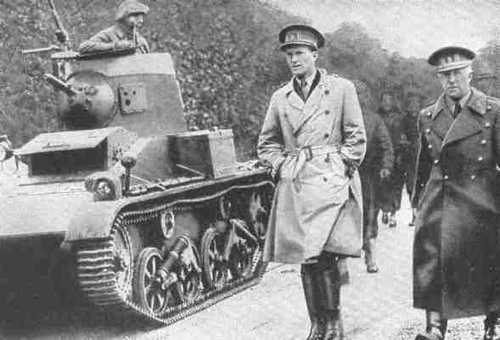
Other Forces
Leopold the Handsome.
Leopold III, King of the Belgians, with General Henri Denis, Belgian Minister for War, during Belgian mobilisation, May 1940. Leopold put himself in command of the Belgian Army when Germany invaded Belgian territory - as his father, Albert I, had done at the outbreak of WW1. Unfortunately, his subsequent actions - which seem to have been guided by a wish to maintain the Belgian Crown, insofar as was possible - in a position independent of (if not exactly neutral of) both Germany and the western Allies - left him in a controversial position in the context of Belgian history. When Belgian defeat appeared inevitable, he refused to leave Belgium (contrary to his Government's advice), insisting on remaining with his Army. When defeat was actually inevitable, he capitulated on behalf of the Belgian Army. Both of these actions in themselves appear honourable (in the latter case, perhaps inevitable) - but both were arguably in contravention of the Belgian Constitution. During the war he lived in German detention, and refused to co-operate in running a German puppet government in Belgium. However, he sought to deal with Hitler to the extent of requesting guarantees of the preservation of Belgium as an "independent" kingdom (not surprisingly, ignored), and issued a "political testament" late in the war which, in its continued effort to distance Belgium from both sides, appears to have been viewed as unhelpful as much by the Germans as by the Allies. His refusal to endorse wartime treaties concluded by the Government-in-Exile in London was particularly unfortunate, since it brought into question agreements with the USA regarding access, among other things, to the resources of the Belgian Congo. The perceived position of ambivalence adopted by Leopold produced (in all-too-typical Belgian fashion) a major split in Belgium as to whether he should be allowed to return as King. Flemings, by and large, supported his return; Walloons did not. A referendum on the subject was, marginally, in his favour. However, when he did return from Swiss exile in 1950, this provoked a general strike and such civil disruption that Leopold was persuaded to abdicate in favour of Baudouin, his son (by his first marriage) in order to preserve national unity and the Monarchy. Leopold III remains a controversial figure in Belgian history - indeed, in Belgian politics. For what it is worth, it seems to me that he did his best to maintain the integrity - indeed the very existence - of Belgium in very difficulty circumstances. In retrospect, it is easy to say that he made several serious mistakes. Perhaps a more charitable judgement is called for, given the very difficult situation he faced from May, 1940 on. Best regards, JR.
1988 Views
10/2/2012
